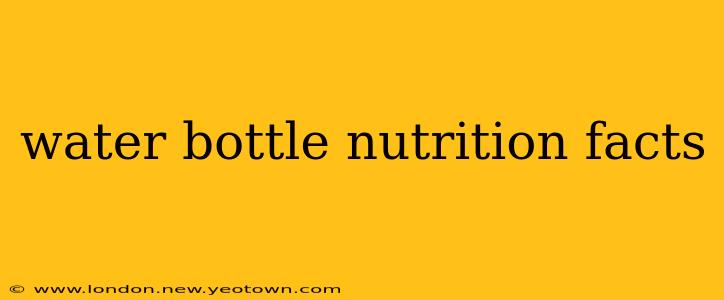We all know staying hydrated is crucial for health. But have you ever stopped to consider the nutritional content—or lack thereof—in your trusty water bottle? While plain water boasts zero calories and zero nutrients, the story can get a little more interesting when we delve into flavored waters, enhanced waters, and even the potential for contaminants. Let's unravel the often-overlooked nutrition facts associated with your daily hydration ritual.
What are the nutritional facts of plain water?
This is the easiest one! Plain, unflavored water contains zero calories, zero fat, zero carbohydrates, zero protein, and zero sugar. It's simply H2O, the essential building block of life. Its primary nutritional contribution is its role in countless bodily functions, from temperature regulation to nutrient transportation.
What about flavored water?
The nutritional profile of flavored water changes drastically depending on the ingredients. Many flavored waters rely on artificial sweeteners, coloring, and flavorings, leading to varying calorie counts and potential added sugars. Some brands opt for natural sweeteners like stevia or monk fruit, but always check the label! Be wary of sneaky added sugars, often hidden in seemingly "healthy" options. Always look for labels that clearly state ingredients and nutritional information. Reading the fine print is key to making informed hydration choices.
Does enhanced water have nutritional value?
Enhanced waters often contain added electrolytes, vitamins, or minerals. While these additions might seem beneficial, it's crucial to examine the quantities. For example, a bottle claiming to be rich in Vitamin C might only contain a small fraction of the recommended daily intake. Furthermore, excessive consumption of certain electrolytes can be detrimental to health. Read the label carefully to understand the precise nutritional content before incorporating these enhanced waters into your daily routine.
Are there any potential contaminants in my water bottle?
This is a concern often overlooked. While the water itself may be safe, the bottle itself can introduce contaminants. Reusable bottles, if not properly cleaned, can harbor bacteria. Some plastic bottles contain BPA or other chemicals that can leach into the water, especially when exposed to heat. Choosing high-quality, BPA-free reusable bottles and cleaning them regularly is vital for maintaining the purity of your drinking water.
Can water bottles contain calories?
Plain water, as mentioned earlier, contains zero calories. However, flavored waters and enhanced waters often contain varying levels of calories, primarily from added sugars and other ingredients. Always check the nutrition label to understand the calorie content before consuming these types of beverages.
What is the best type of water bottle for hydration?
The "best" water bottle depends on individual preferences and priorities. Some prefer reusable bottles for environmental reasons, while others find single-use plastic bottles more convenient. Consider factors such as material (BPA-free plastic, stainless steel, glass), size, and ease of cleaning when making your choice. Remember, regular cleaning is paramount, no matter what type of bottle you use.
How much water should I drink per day?
The recommended daily water intake varies based on factors such as age, activity level, climate, and overall health. There's no one-size-fits-all answer, but general guidelines recommend aiming for adequate hydration throughout the day. Listen to your body – thirst is a good indicator, but don't wait until you're parched to reach for your water bottle.
Staying hydrated is vital, but understanding the nutritional nuances of your water source – be it a simple bottle of H2O or a more complex enhanced beverage – empowers you to make informed choices. Remember, always read the label, prioritize cleanliness, and choose options that align with your health goals.

